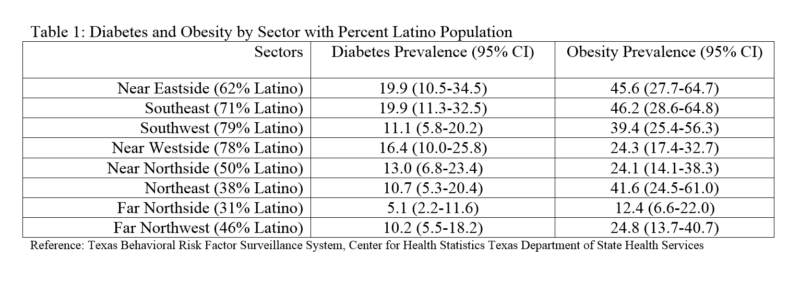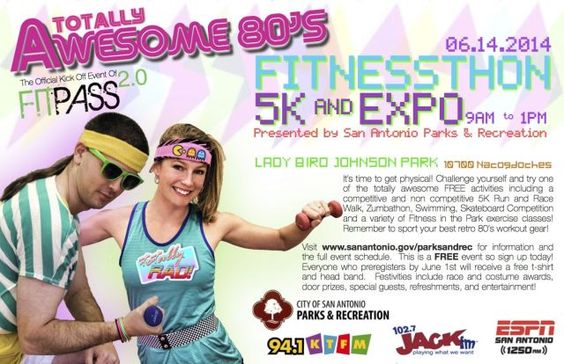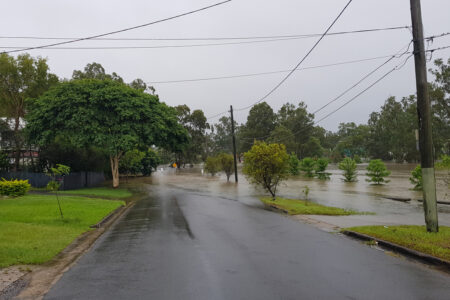Share On Social!
City parks worker Michael Baldwin saw rampant physical inactivity and disease in San Antonio, Texas (68% Latino).
To help, he wanted to attract people to existing health programs and services in city parks.
Baldwin and his team, through local collaborations, developed Fit Pass, a city-wide scavenger hunt for wellness and physical activities.
People can download a phone app or a bilingual Fit Pass passport that can be stamped for attending some of 2,300 activities across San Antonio parks, incentivizing Latino families to get physically active and play in parks.

Physical Inactivity in San Antonio
Michael Baldwin, special projects manager with the City of San Antonio Parks and Recreation Department (Parks Department) in San Antonio, Texas, has helped develop and implement programs at the local level for many years.
Baldwin saw many Latinos struggling with health.
Many San Antonio adults were obese or overweight (65.7%), did not meet recommendations for weekly physical activity (49.7%), and reported no physical activity in the past month (25%), 2010 city data showed.
Latinos in particular live in at-risk subsectors of the city with high obesity and diabetes rates and few physical activity opportunities (parks, health clubs, fitness programs, and sports fields and courts). Latinos face barriers to accessing physical activity, including cost, logistics, lack of transportation and childcare, programming that is not linguistically or culturally relevant, and poor marketing and educational outreach.
This situation leads to health disparities, like diabetes, chronic disease, and certain cancers.

Since 2010, city officials have increased efforts to reverse these trends.
The San Antonio Mayor’s Fitness Council (MFC), a group of public and private representatives appointed to stimulate local health, helped create Fitness in the Park (free fitness classes in city parks) and Síclovía (a biannual open streets initiative hosted by the YMCA with support from the city, H-E-B, and Humana).
Read our Salud Hero story about Fitness in the Park.
Baldwin and Travis Davey, a Parks Department community services supervisor, and their team wanted to further reduce service gaps, remove barriers to access, and attract at-risk populations to existing health and wellness programs.
Baldwin learned at a 2012 MFC meeting about city funding for a health and physical activity initiative.
But it would require the immediate implementation of a pilot program.
During the meeting, Baldwin, who had previously discussed with his team an idea for a scavenger hunt in city parks, proposed a more elaborate, citywide scavenger hunt of existing health and physical activity initiatives.
A Scavenger Hunt for Health
Baldwin and his team decided to pursue available city funding and create a pilot program for a scavenger hunt that would promote Parks Department offerings (community centers, pools, outdoor fitness stations, and Fitness in the Park) and other free or low-cost wellness programs.
They searched for any similar large-scale wellness scavenger hunts in other cities.
“There wasn’t anything like this,” Baldwin said. “We had to develop it from scratch.”

Baldwin and his team began to compile a list of existing physical activity, nutrition, and wellness activities to ask for cooperation. They approached Parks Department programs, MFC partners (YMCA, H-E-B, San Antonio Sports, the Witte Museum), and private groups.
“It was easy to develop partnerships with groups implementing health and physical activity initiatives because we were already at the table with many of them,” Baldwin said.
Baldwin, Davey, and their colleagues conducted internal strategy sessions to develop the scavenger hunt.
It could start at the beginning of summer to provide fun, healthy activities for the entire family while kids were out of school.
They came up with the stamp-and-passport idea to track participation and points.
The passport would include free and low-cost fitness, wellness, and nutrition activities provided by partners. Participants would get a stamp in their passport when they participated in the activity.
Stamps would translate into points, which could be exchanged for prizes.
Bilingual ‘Fit Pass’ is Born
The city manager approved the city funds for the Parks Department’s pilot program for the scavenger hunt, which they eventually called Fit Pass.
The Fit Pass pilot program began in summer 2013 for nine months.
Baldwin’s team also worked with the city and other partners to feature health and wellness activities in the passport, and they worked with a vendor to develop the passport in English and Spanish.
 Passports could be downloaded from the city’s website.
Passports could be downloaded from the city’s website.
Fit Pass awarded points for attending Fitness in the Park classes and using city pools, trails, and outdoor fitness equipment, which built synergy among Parks Department programs and incentivized family participation.
“A point system with prizes for healthy behaviors] is a great incentive for some people, whether you’re aiming to win something, setting goals for yourself, or just competitive by nature,” Baldwin told Parks & Recreation magazine.
The pilot program was a success.
Baldwin said they benefited by attracting more people to their services and programs, public and private organizations benefited from extra publicity, and families benefited from access to many free or low-cost health and wellness activities.
In 2014, they made one big tweak, shortening the duration to promote sustained excitement among participants, allow more businesses to commit to temporarily offering services for free or low-cost, and expose families to new activities they could participate in not only in summer but for the rest of the year.
They sought similar funds from the city to run the tweaked program in summer 2014.
Change: The City approved the tweaked Fit Pass program.
Fit Pass Grows in Popularity
For the 2014 season of Fit Pass, Baldwin, Davey, and their partners added a kick-off event and included some participant questions on the passport (name, age, gender, zip code, and physical activity level) to determine program impact.
They merged the kick-off event with the city’s “Totally Awesome 80’s Fitnessthon,” where they also unveiled Mobile Fit, their retrofitted van that travels year-round to schools, parks, and events with fitness equipment, a health screening kiosk, and an interactive gaming system.

Fit Pass, although only three months in 2014, promoted twice as many wellness activities and generated three times as many completed passports than the nine-month pilot program.
Baldwin and his team sought and gained continued city funding in 2015.
They modified the prize structure and added a mobile app for iPhones (and later for Android phones) to track points and help participants geo-locate activities.
Fit Pass now offers more than 2,300 activities at free or low cost at multiple times and multiple locations across the city (with bilingual materials) to accommodate as many residents as possible.
When people see their friends and families participating in accessible, culturally relevant, fitness programming (called observational learning), it encourages behavioral capability, self- efficacy, and participation.
In 2016, funds for Fit Pass officially became part of the Parks Department General Budget from the city, which is part of the same budget as Fitness in the Park. This reduces some pressure to develop proposals every year; however, as with all departments and all programs, they continuously have to justify the continued effectiveness of the program through efficiency reporting and participant success stories.
The 2016 Fit Pass kicked off alongside the grand opening of San Antonio’s biggest park, Pearsall Park-a former landfill.
San Antonio City Council member Rey Saldaña (D4) was awarded $8.5 million for park improvements in the 2012 bond and proposed his idea for a destination park to his constituents, rather than splitting the funds among numerous district parks. The 526-acre park includes a BMX and mountain bike courses; a dog park; a zip line; a disc golf course; a basketball court; and a CrossFit pavilion; as well as the largest splash pads, playground, and skate park in the city and the only park in the city with a 5K, 10K, and single loop half-marathon course.
The Parks Department continues to build sustainability into the program by expanding partnerships with local organizations and tie-ins with Parks Department fitness initiatives, such as Fitness in the Park, Troops for Fitness, and Mobile Fit. Similar to previous years, Fit Pass 2016 winners will be announced and awarded their prizes during the September 2016 Síclovía event.
“Because we’ve made such a strategic and concentrated effort in integrating wellness into our parks system over the past several years, you can really see a change in how people see and use our parks,” Baldwin told Parks & Recreation magazine. “You see more people exercising outdoors, biking on our trails, walking their dogs and taking advantage of what have become very active spaces.”
By The Numbers
33
percent
of Latinos live within walking distance (<1 mile) of a park
This success story was produced by Salud America! with support from the Robert Wood Johnson Foundation.
The stories are intended for educational and informative purposes. References to specific policymakers, individuals, schools, policies, or companies have been included solely to advance these purposes and do not constitute an endorsement, sponsorship, or recommendation. Stories are based on and told by real community members and are the opinions and views of the individuals whose stories are told. Organization and activities described were not supported by Salud America! or the Robert Wood Johnson Foundation and do not necessarily represent the views of Salud America! or the Robert Wood Johnson Foundation.



